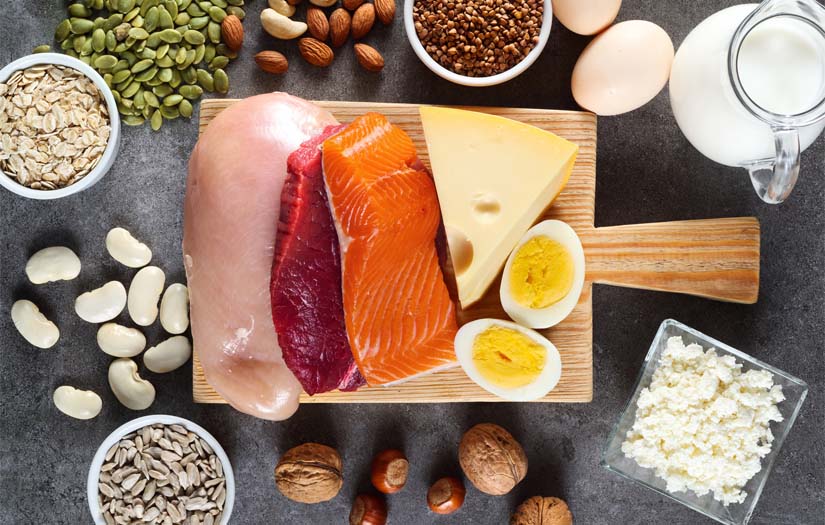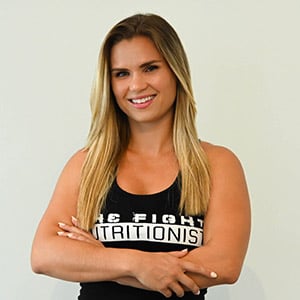Rest days: the bane of every fitness enthusiast’s existence, or perhaps the favorite day of the week! Either way, the biggest question everyone has is what the best foods are to consume to build muscle and stay on track.
When it comes to building muscle the most influential factor is protein. The body is in a constant state of protein turnover (building muscle and breaking down muscle), but to be in a more positive protein balance (building muscle) one must consume exogenous protein sources.
Another food that is key to building muscle is carbohydrates. The synergistic effect of protein plus carbohydrates has a much greater effect on building muscle compared to consuming protein or carbohydrates alone. However, many of you are probably concerned about carbohydrate intake on rest days… And you’d be correct to assume that with less activity, such as on a rest day, not as many carbohydrates are needed.
So, what are some simple strategies and foods to consume to stay on track when you aren’t spending hours in the gym?
Step 1: Start your day with a rich source of protein
Upon waking up, within the first hour you should aim to consume 30-40 grams of protein (ideally the higher end). Sleeping is the longest fasting period of your day, and during that fasting period, your body is mostly in a state of breakdown to support basic physiological functions. Part of that breakdown includes your muscles!
To tip the balance in a more POSITIVE direction, you must consume a rich source of protein. One study that looked at the effects of protein pacing showed that consuming a meal rich in protein within 60 minutes of waking up had increased strength and power in exercise-trained individuals (1).
Remember, a rich source of protein is defined as a food that contains both all the essential and non-essential amino acids. Examples include dairy products, eggs, whey protein, turkey bacon, and any other animal-based products.
Step 2: Consume ~30g protein every 3-4 hours
Remember protein turnover? The shift from building to breaking down muscle waxes and wanes throughout the day. Research has shown that the best method to maintain a positive protein balance is to consume roughly 25-30g of protein every 3-4 hours to stimulate muscle protein synthesis.
In studies comparing protein feedings throughout the day, 20g doses every 3-4 hours showed greater rates of protein synthesis compared to 80g doses separated by 12 hours or 10g doses consumed every 90 minutes (1).
Step 3: Focus on the 1:1 ratio
Carbohydrates are protein’s best friend! However, on rest days you don’t need to consume AS many carbohydrates as you would on your more active days. However, to stimulate some muscle growth we want to combine protein and carbohydrates. Employing the 1:1 ratio (using 30g of protein as a reference) is a great way to minimize carbohydrate intake but still build muscle.
Here are some examples:
- 4oz lox salmon over 1/2 medium-large bagel
- 1 fair life core power + 1 medium banana
- 5oz zero sugar Greek yogurt + 2 hardboiled eggs + 1 medium apple
- 4oz ground chicken + 3/4 cup wild rice
Step 4: Focus on Vitamin D-rich foods!
Vitamin D helps increase muscle protein synthesis and ATP concentration! Low levels impair the ability to build muscle, so on rest days, pay attention to its importance. Studies in rats have shown that Vitamin D deficient mice had higher rates of atrophy, lower lean mass, poor aerobic capacity, and trends towards smaller fast twitch fibers (2).
Therefore, deficiency alters many mechanisms involved in muscle growth, so consume Vitamin D-rich foods on rest days to ensure proper recovery and lean mass maintenance. Foods rich in Vitamin D include salmon, herring, sardines, whole eggs, fortified cow’s milk or soy milk, trout, and mushrooms.
Step 5: Consume a pre-sleep protein shake
There has always been a long-lasting controversy over-overeating late at night. However, recent research has shown that the consumption of 40g of protein 30 minutes before sleep can increase overnight muscle protein synthesis (1).
The most beneficial protein to consume late at night is casein protein - the more slow-digesting protein. Casein protein can be found in milk, yogurts, and cheeses (if you’re looking for whole foods sources in place of a supplement).
The overall take-home message? The best thing to consume at any given time whether you are exercising or taking rest days is PROTEIN. Rich sources such as turkey, chicken, beef, eggs, fish, and dairy products are beneficial to maintaining muscle.
Practicing protein pacing and consuming roughly 30g of protein every 3-4 hours is the stimulus needed to stay in a protein balance and consuming roughly 40g of casein protein 30 minutes before bed can keep you in a building state even while you sleep! Protein is king, so don’t neglect its importance… even on rest days!
References
https://www.tandfonline.com/doi/epdf/10.1186/s12970-017-0189-4?needAccess=true&role=button
https://www.ncbi.nlm.nih.gov/pmc/articles/PMC6422984/

















